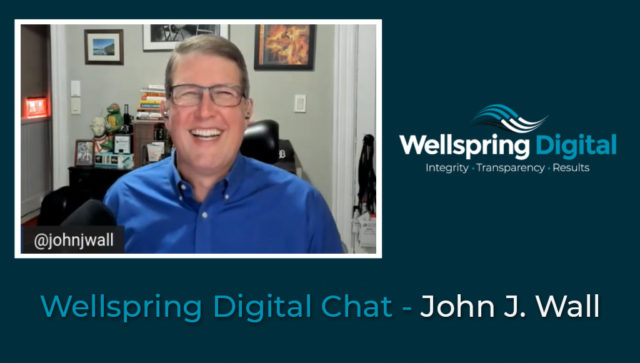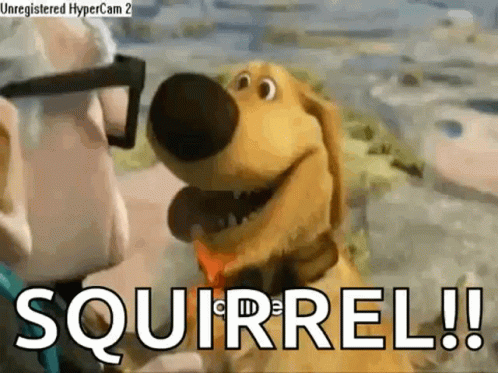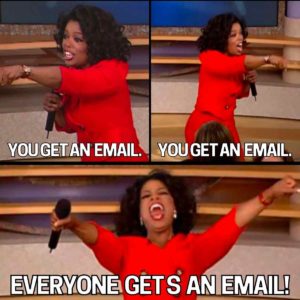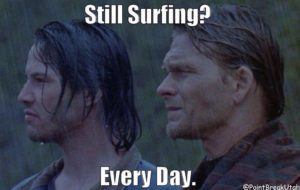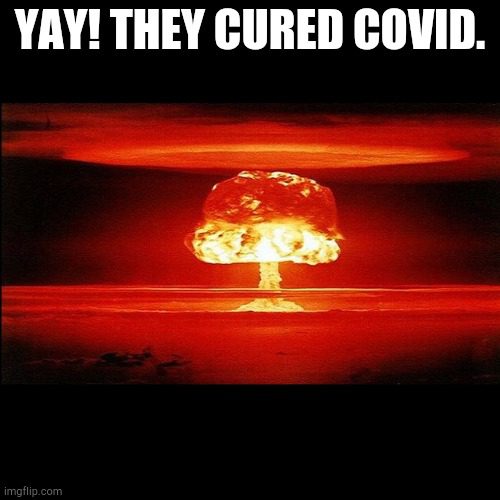In this episode of our Wellspring Digital Chat series, we bring you John J. Wall, completing the trifecta of Trust Insights partners. We also interviewed Christopher S. Penn and Katie Robbert. And let me assure you, they are all great! Tons of good stuff in each.
That said, I would argue that John is the “normal one.” What that actually means is up for debate. John is also the co-host of the long-running and always excellent podcast, Marketing Over Coffee. Chris and John usually end up costing me money with their tech and app recommendations, but it’s always worth it!
In this episode, John and I discuss…
- Event marketing post-pandemic
- Staying on top of the ever-changing digital marketing landscape
- App and tech tool recommendations
- Marketing automation and the battle of the inbox
- Google’s Helpful Content update
Let’s do this!
Digital Transcription (Edited for Readability)
Introductions
Jon-Mikel Bailey: Hey kids, I’m Jon-Mikel Bailey, and welcome to the Wellspring Digital Chat, where through a massive charm offensive we’ve been able to really kind of con a bunch of marketing experts to come and talk to me. And it’s purely selfish. I’m really just trying to improve my own personal knowledge base. But in doing so it seems I have unlocked some great bits of information for you, the viewer. So I hope you don’t mind that all of this is a selfish endeavor. But you know, at the end of the day, isn’t it really all about, you know, taking care of number one?
John J. Wall: It’s an easy sell. There’s no marketing person that is going to be like, I really don’t feel like talking about myself. I’m sorry.
Jon-Mikel Bailey: Yes. So I know of our guest, John Wall as the co-host of the long-lived and very awesome podcast with Chris Penn, called Marketing Over Coffee, I will put a link in the show notes, and I highly recommend checking it out. He’s also a partner with Wellspring Digital Chat alums, Katie Robbert, and the aforementioned Christopher Penn at Trust Insights. So John has always struck me as the normal one. But you know, we’ll see. We’ll see. So, John, welcome. Please take a moment to introduce yourself to these fine, folks.
John J. Wall: Oh, thank you. Well, you hit the high points there. You know, I’m best known as the producer and co-host of Marketing Over Coffee. And then, yeah, we’ve been doing that for over 15 years. And about three or four years ago, Chris Penn spun off from Shift Communications. Katie Robbert went with him, and she’s the CEO and keeps us in line. And so I started working with Trust Insights. The stuff we were doing with Marketing Over Coffee overlaps so well, that it just made sense to do stuff with them. And yeah, I live out in the middle of nowhere in Western Massachusetts, and I have two kids and a dog. So I have no free time.
Jon-Mikel Bailey: See, now technically, can you really call anywhere in Massachusetts, middle of nowhere, because it’s kind of a small state, and it’s on the East Coast, but I’ll give it to you. I’ll give it to you.
John J. Wall: Well, it’s something because yeah, I’m on the very western side. So I literally can throw a rock into Vermont or New York from where I’m at. Okay. And for most people, you know, Worcester is Western Mass, maybe Springfield. So yeah, we’re in the hinterlands.
Jon-Mikel Bailey: Exactly. Alright, so. So I read your bio, and you love dogs, and you love metal. So already, I know, we’re good. But I want to get into some marketing talk here and see if we can, you know, get a little deep. So you ready to bring some knowledge to these, these good, folks?
John J. Wall: Let’s give it a shot.
Jon-Mikel Bailey: All right.
Events and Event Marketing Post-Pandemic
Jon-Mikel Bailey: So, you know, I always got to fit in a pandemic question when I have a chance. Why not? But you used to work for an events marketing agency? And I’m curious what your take is on the effect of the pandemic on events. Are there any positive, unintended consequences that marketing people may be missing? Are there new opportunities for them that they may be missing? In your view?
John J. Wall: Yeah, the short answer is no, this is a total disaster, complete burning of the fields and to everyone. There are a few things that, you know, obviously, there’s people are going to try and make lemonade out of lemons. And there’s been a lot of improvement on the virtual work front. You know, and in meeting software, being able to do stuff virtually, that’s come along well. And I think it has forced people to think a little bit longer and harder about like, “Who are you going to put on stage?”
Because that’s the real thing is that live events are not about the presenters or the show at all. It’s about going to business people and saying, “Hey, you can go to this other city for four days. And you can hang out with people who do what you do and have a good time.” And really, for a lot of shows, the speakers and the main sessions were just vendors who ponied up the money to put their somebody up on stage and talk about their product. And most of those sessions are terrible.
So this has forced people to say like, “Okay, if we’re going to put something out there for 50 minutes or an hour, it’s gotta have, you know, people have to like it, because now that it’s virtual, they’re not going to show up. They’re just not going to be there.” And we have seen the data on this. It’s been insane. All of these companies were “Yeah, we used to get, you know, 500 registrations for a webinar, and we used to get 120 attend.” Now they’re like, “Yeah, we got 45 registrants and three attended live webinars.” That’s been the state through the heart of webinars.
Jon-Mikel Bailey: Kind of surprising, but maybe not. Considering everybody was stuck at home. But yeah, I guess, well, okay, so, follow up to that, you know, in your mind, what events lately have really kind of weathered the storm the best or, or do you feel qualified to answer that question?
John J. Wall: Yeah, I mean, no, I’d say this quarter right now is the first one, we’re having some normal events. In fact, the real bellwether forces, as we’re talking Dreamforce is going on right now. So when we see how many people show up there and how that goes, that’s going to be huge. Like, when this is like primetime. We had Inbound, last week or the week before last, I guess, which was pretty normal. It was almost back to normal.
Jon-Mikel Bailey: I think Content Marketing World, I think, is it going on now? Or just went on? I forget.
John J. Wall: Yeah, that was last week.
Jon-Mikel Bailey: That’s right.
John J. Wall: Yeah. Which was also really weird, because normally those two end up on the same week, and people will complain because they’re having to fly to both at the same time. So they actually got those apart. But yeah, I don’t know. I think it will be a return to business. I think people want to do this. But the question is this, it’s still it’s just unprecedented in humanity, where we’ve had something happen where it’s really bad for people to get together.
I mean, through the entire human evolution, people getting together has always been like, “okay, we’re safer.” It’s easier to gather the point. Yeah, it’s all good. And now, it’s even, it’s exacerbated by a lot of introverts that are like, “yeah, do we really have to end this lockdown stuff? Like, I kind of like this not having to go out. You know, I mean, my wife is one of them. She would much prefer to stay here.
Yeah, you know, Amazon brings me my stuff. And it’s, you know, life is good. So, yeah, no, it’s a huge disaster, because I had, I was actually working on an Advanced Startup prior to Trust Insights. And it was just completely destroyed. I mean, we shut down the domain and went home. And yeah, I don’t know, events are just like, such a crazy thing to like, you never know what’s going to happen when you throw people together.
And it’s yeah, I could go on forever about some of the insanity that I’ve seen there. But this is not the same story over the years.
Staying on Top of the Ever-Changing Digital Marketing Landscape
Jon-Mikel Bailey: Well, speaking of things getting destroyed, in the Marketing Over Coffee Playbook, which is the book companion to your podcast, one of you, I assume it’s you, but maybe I don’t know, somebody says accurately that almost every part of marketing gets completely destroyed and rebuilt about every 10 years, which I completely agree with. What’s your advice to a marketer trying to keep some sanity in a sea of shiny objects?
John J. Wall: Yeah, it’s a constant struggle. It really is. And squirrel!
Yeah, it’s just like, I was 16 lock screens, like, I’ve spent three hours on lock screens this past week, and that provides no value whatsoever to anyone. But here I am. The thing that’s insane is that we have this rapid turnover. Technology is accelerating, increasing at an accelerating rate, and getting worse and worse. But what doesn’t change is that as humans, we’re still like, 10,000 years evolutionarily behind. Humans are not designed to deal with any of this.
Everything around us is now an affront to what we were built to do. So it ends up, as a marketer, you have to translate, you know, how does this affect people with their behavior change? What kind of new options do they have? So you’re constantly kind of scanning and trying to figure out what to do. And then it’s just, there’s a spectrum of how much risk you’re going to take. Larger organizations take no risk, they just sit back and wait for Tik Tok to get a billion users, and then they’ll jump in.
Versus smaller organizations where you start to take kind of crazy risks hoping that you, you’ll pull the slot machine and hit something now and then get outsized returns to help get you to become a larger company where you can become stodgy and, you know, conservative like everybody else at the top.
Jon-Mikel Bailey: I wonder if that’s like a sort of a vertical-based phenomenon, meaning, you know, one type of business is more apt to take risk versus another type, which is like, well, we’ll hold back and see if that’s real. I mean, do you agree?
John J. Wall: Oh, absolutely. Yeah, that there’s a complete spike, because anything that touches tech, there’s so much churn there. It’s like the places where you find people now, there was nobody there two years ago, and the places that used to work two years ago are completely useless in a lot of circumstances. And then contrast that to the restaurant industry. The pandemic was the first time I think the restaurant industry really got a kick in the pants with having to order online and having to bring stuff outdoors, have pickups, and things like that.
Otherwise, I mean, it took, 20-plus years for them to get into POS systems, into modernizing restaurants because there’s just no need to do it really. If people are showing up for the pizza. You’re all good.
Jon-Mikel Bailey: Conflict spurns innovation. Very, it was very interesting to watch the restaurant industry scramble and see who kind of took advantage of it and innovated quickly, and took the risks and it paid off. And then others who just kind of said, “we’ll just hang out and wait two weeks for the curve to flatten. This will just blow over and we’ll be fine.” It’s nothing, nothing.
App and Tech Tool Recommendations
Jon-Mikel Bailey: Speaking of shiny objects, you and Chris are both total tech geeks. In fact, this microphone is a Chris Penn recommendation. And I get compliments on it all the time. So once again, thanks, Chris, for being awesome in your tech recommendations. But you know, I tried to follow his advice on tools, apps, and gears, but I’m curious what’s your favorite new app or tool for marketing these days?
John J. Wall: Yeah, that’s so funny. Well, I just have to laugh because like Chris giving you microphone advice, that’s the classic podcaster thing, let’s just talk about microphones all the time. This is the great thing. But so I can’t like I’ve got the Beats their new pods. Yeah. But yeah, it is just insane. I’ve remembered my mind, if I open the case up, it will connect all this stuff and everything will go down the drain.
So I have to give it shot. But the fact that I would recommend a pair of Beats for the past 10 years, I’ve made jokes about how they’re garbage. You know, the line has always been they make fantastic $50 headphones, right? They sell for $299. Right. But they’re just nuts. They’re amazingly good. So that’s on the gear front.
And then for podcasting, the Rodecaster Pro to this new soundboard that I’ve got is just ridiculous. It’s like $2,000 worth of audio gear crushed into a $700 box.
Jon-Mikel Bailey: So crap, you just cost me $700
John J. Wall: Oh my god. Yeah, if you’re doing any audio, it’s just nuts because it has all the cool radio, you know, if you really want to get that big radio sound and the phrase that pays, we can hit you with this box. It’s totally got that thing going for it. So right. That’s huge.
As far as I don’t know, it’s a little bit weird in that the tools and apps stuff has kind of plateaued a little bit. We don’t see as much total change. Now it’s kind of like you’re having to go through the feature list and be like, Okay, do I use Salesforce or HubSpot or Zoho or whatever. You really have to kind of dig deep and go. But another rando thing lately too, is I’ve been using Google’s Mail Client on my iPhone, which I never thought that I would be doing. But it works so much better. It’s faster and cleaner.
Jon-Mikel Bailey: And isn’t that a sign of the apocalypse?
John J. Wall: Yeah, exactly. It’s just like the beats. You’re just like, why the hell does that even work? And I think my theory is that when I’m using the Apple client and trying to get my Gmail, I think that Gmail is being like, “oh, yeah, sure. You’ll get it in 30 seconds.”
And meanwhile, if I get the Gmail app, I’m like, wow, everything’s so fast. And it’s like, I’m too damn cheap. I can’t, I still just cannot buy Superhuman for 30 bucks a month. I’m just like, 30 bucks. You know, it would probably save me 20 hours a year. But I’m just like a curmudgeonly old man like that. I’ll be dead before I pay 30 a month for an email client. This is ridiculous.
Jon-Mikel Bailey: I am such a curmudgeonly old man when it comes to technology. I get so cranky with software and its user experience. I’m such a snob. I’m just like, why would they put this here? It doesn’t tell you…
John J. Wall: It’s like, and I’ve even come to the point now. Like, I used to just try everything new all the time. And now I’m like, “No, I’ll wait till 16, that too. You know, I’m not going to download 16 Because like, there might be something weird that’s going to hose me and I don’t want to do I’m too cranky to deal with it.
Jon-Mikel Bailey: It’s well, it’s exhausting, too. Because there’s constantly some new software or feature or whatever. It’s like, all right.
John J. Wall: It’s like the letdown. I love when you’re like contemplating the upgrade. And of course, because you’re a geek, you go into the release notes. And you see like, there’s like 65 things and they’re all like for devices you don’t have. It’s like, “hey, you know, pen support on the iPad, and you’re like, I don’t have a damn pen.” But it’s yeah, you gotta love that kind of stuff. It’s just the life of the geek.
Jon-Mikel Bailey: Oh, that’s great.
Marketing Automation and the Battle of the Inbox
Jon-Mikel Bailey: So staying with technology for a second in the world of automation, we keep coming up with new and clever ways to grab someone’s attention in the inbox, it’s a sacred place and we keep invading it. But recipient recipients are getting better at sniffing out and ignoring a pitch. So are we fighting a losing battle? Or is there another approach that marketing marketers might be missing with automation?
John J. Wall: You know, automation is always there and cranks up the analogy I have, my tired analogy that I always roll out is surfing. Marketing is just like surfing, right? It’s like, it’s all the same principles. But every day is different. Every wave is different, you have to kind of do different things.
And so you can get into this, you know, spy versus spy, or cat versus dog thing of just like, oh, okay, this week, it’s having an emoji in the subject line, you know, like that works. And it will work for like, a month or two or whatever, depending on how tired and how fast your vertical is. So, yeah, there are a lot of things you can do. I think when it comes to pitches, though, people just get the pitch wrong.
I mean, the biggest thing that I see is that people make pitches and they’re bragging about features. They’re just like, “hey, version 23.5 is out, get it today.” And of course, every user is like, “I don’t give a damn about point four versus point five, that means nothing to me.” So people who take the time to get a pitch where it’s like, “Hey, would your life be better if you could do this?
People that take the time to craft the pitch, get through the clutter, and make it work. But yeah, I guess you could say it is always a losing battle. You just always gonna roll the dice and stuff is gonna work, and eventually, it will stop working. And you’re gonna have to find another way to do it. And hopefully, you get enough momentum that you have a pile of happy customers.
That’s the ultimate goal is if you have a pile of happy customers, they’re going to talk and refer you and make recommendations. And that’s what kind of gets you out of the dungeon of like, okay, we have to every month have an email that gets a 40% open rate, 20% click, or we’re gonna go out of business. You have to get out of that hell or you’re just never going to survive long-term.
Jon-Mikel Bailey: Make it about the reader always and you’ll be in better shape. And it’s amazing to me how few organizations recognize that and just lead with features. It’s kind of like leading with the chin, you know?
John J. Wall: Yeah, well, the insane thing is the worst people that can critique and come up with offers are the people in the company. It’s the people around the conference room table, like they hear about the brand every single day, they hear about the features every single day, they are literally the worst possible people you can bounce an idea off of because they are nowhere near a prospect who’s like, “Who the hell are you?” You know, “what do you do? I’ve never heard of you.”
Jon-Mikel Bailey: You know, what else cracks me up is? Man, I really shouldn’t say this, but I’m going to anyway, but you know, HubSpot? I think they’re the ones who coined the term inbound. And I know they have the inbound conference. And yet, I don’t know if you can necessarily classify it as outbound. But they’re pretty aggressive. And in my mind, I wonder like, I don’t know, I don’t know what I’m trying to say. And I’m trying to not like…
John J. Wall: This is too bad we’re not over drinks because I have a fantastic story about this, about HubSpot. Let’s just be honest. Right. At HubSpot, there is a room where there’s like a ton of salespeople who are following up with leads and trying to get deals to close. So, they are the inbound company, and inbound is often the most cost-effective and the way to go. But the reality is any company that answers to the street is trying to deliver the quarterly number and churn and burn, smile and dial is part of that.
Whether you want to believe that or not, it doesn’t matter, because that is the way it is, you know, we’ve seen it. And, you know, I’ve had companies lawyers come back and tell us don’t talk about that, you know, you don’t have the right to talk about that. And they’re also right, so we’re not going to go any much further on this. But yeah, no, you’re totally right, that it’s true.
There is this thing of, you know, ultimately, as a marketer, your goal is to change behavior. And so yeah, hopefully, you can make some cool stuff that made people get excited and come over to you and ask you what’s going on. But there’s always the PT Barnum of like, “step right up, come see, this amazing world’s smallest hairless dog is right over here!” You know, “come get excited about this and come check it out.”
That’s always going to be part of the schtick.
Jon-Mikel Bailey: I just had the visual, the world’s smallest hairs and hairless dogs. I’m going to kind of sit with that first.
John J. Wall: That’s a hot dog. That’s the joke that people pay five bucks to go in and there’s a hot dog in the band, you know, and
Jon-Mikel Bailey: I’ve not heard that one. That’s good stuff.
John J. Wall: Yeah. There are a ton of comparisons to the present day and swindlers and all kinds of great to the lowest of humanity.
Jon-Mikel Bailey: It’s a little bit of bait and switch. But you know, I’ll give you some latitude.
John J. Wall: Exactly, you don’t necessarily false, it’s not a flat-out lie, right? It wouldn’t have some court, you know, everyone’s gonna, they’re gonna run you out of town after four days, which is what happens to every circus, but you know, you leave with money.
Jon-Mikel Bailey: So now I’m just thinking about the hot dog memes that I can put in the show notes of this (see above). Yeah, but anyway.
Google’s Helpful Content Update
Jon-Mikel Bailey: So before I let you go, I want to dive a little bit into Google and content. I’m curious to hear your take on the Helpful Content Update that Google just rolled out. I’ve seen some people lost their minds about it, and some people thought it was, Meh. So they continue to put the hammer down at least publicly on garbage content with updates like Panda, with their E-A-T guidelines in the review guideline, and this latest update. So do you think it’ll work? Because I’ll be honest, I still see a lot of crap in Google, even though they claim they’re fighting to eliminate it.
John J. Wall: Yeah, it’s an endless battle for them too you know, they have the same problem right that it has to go. And the weird thing about this helpful content thing is we’ve seen some cases where the human-written stuff actually didn’t make the cut, and some of the AI stuff has. And when you dig in a little bit more, it’s like, well, because the AI stuff is actually better, just because a human wrote, it doesn’t mean it’s not garbage. So that is totally real.
And the other thing that I don’t think gets as much press though, is just the fact that Google is continually trying to take everybody’s lunch. Originally, the idea was, we’re a directory, and we push through where you want to go. But now they’re pulling up answers and content from your site, literally taking your traffic. They’ve basically become the schoolyard bully now, and that’s the bigger part of it is that they’re just consuming the whole market. And yeah, I don’t know.
Jon-Mikel Bailey: They did the one update with the car listings, which was, you know, like, “Okay, we’re gonna show all these car listings right on Google, so sorry, about your luck, but we’re taking that traffic, you know, hopefully, you’ll sell some cars.”
John J. Wall: Yeah. And in a different time, you know, the monopoly bells would be ringing and the government would be stepping up already to dismantle that. And you see the same thing on the ad side, like, it’s insane. When you think about you’re like, okay, so wait a minute, you sell it, you manage the channel, and you provide the results. And you don’t even have visibility into where the heck they’re ending up. Like, it’s just insane. But I don’t know if that’s where we are. And as long as people are throwing money at it, and they’re making money off it, then everybody’s happy. But yeah, it’s just, again, the never-ending cycle of fighting for your life every day and pray you survive.
Jon-Mikel Bailey: I mean, it’s pretty unprecedented in the tech world that Google has been the top dog for so long. It’s kind of unheard of. And, you know, I keep waiting, you know, doubtfully, that someone’s going to come along and knock them off the number one spot, but it just doesn’t seem to ever happen. You know, I don’t think Microsoft is the company to do it. Bing might be the most wonderful search engine in the world, but Microsoft isn’t gonna, you know, they’re not sexy enough. So, they’re not going to…
John J. Wall: Yeah, I know that. Because one of the weird things we’ve noticed is so you see, all these other search engines pop up, like I’ve got
Jon-Mikel Bailey: DuckDuckGo and…
John J. Wall: DuckDuckGo and Ecosia. This one that, you know, they plant a tree for every search and all that stuff. Except for a bunch of those, you dig deep and you’re like, oh, yeah, no, that’s all Bing data underneath there. That’s, that’s still all Bing.
But yeah, I, and then it’s the human thing. It’s just like, “Well, my Gmail is here. You know, I’m doing Google.” I’m just kind of locked in this infrastructure. Like, there’s no reason for me to go anywhere else. So yeah, I don’t know. It seems like there’s no reason to sell your Google stock yet. That’s for sure.
You know, until something pops on the radar that people like more, there’s nothing there.
Jon-Mikel Bailey: Well, when the name of your company becomes a verb in the common lexicon, you’re kind of, you’re kind of solid.
John J. Wall: The big question is do these things take over government? Like, do they just become the new law of the land? You can make a case that eventually it’s gonna get to that point, but it’s…
Jon-Mikel Bailey: Great, now you just ruined my Tuesday. Thanks, John.
John J. Wall: That’s it. Yeah, we couldn’t get apocalyptic enough with COVID. We were gonna turn up another notch.
Jon-Mikel Bailey: I’ll end this with some sort of mushroom cloud.
Jon-Mikel Bailey: Well, John, there’s a lot of great stuff in here. And I really, really appreciate your time. And, I’m not gonna lie, I’m gonna stand by what I said. I think you are the normal one. And that’s a good thing.
John J. Wall: Well, yeah, I’m definitely the extrovert of the bunch. So that factors into it.
Jon-Mikel Bailey: So thanks so much.
John J. Wall: Thank you.
Jon-Mikel Bailey: Bye, everybody.
